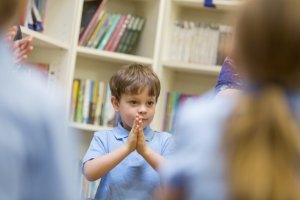Religious Education is outdated, unpopular and opens the door to proselytising.
There are many more subjects children and young people need to learn.
It's time to replace RE with something more appropriate for 21st century students.
It is important for children and young people to learn about different religions and beliefs. But we don't think our schools need a dedicated subject to do this – especially a subject as out-of-date and as irrelevant as Religious Education (RE).
Surveys consistently show RE is one of the least popular school subjects, an indication of its increasing irrelevance.
58% of British adults think religious studies is unimportant at secondary schools. And a quarter of England's secondary schools do not offer RE.
Unlike any other compulsory subject, RE is determined at a local level in England. In each local authority the agreed syllabus for RE is determined by committees representing the Church of England and other religion and belief groups, as well as the local authority and teacher's groups.
As a result, schools not only face a local lottery regarding what their RE syllabus will contain; they will have to teach a subject under significant control from religious interest groups. These groups are strongly motivated to ensure their religion is represented in an overwhelmingly positive light. The current arrangements mean the subject lacks objectivity.
Many faith schools don't even need to follow the locally agreed syllabus and can instead teach religion from their own exclusive viewpoint.
A new nationally-determined civics and citizenship subject could encompass teaching about religious and nonreligious worldviews and allow students to consider moral and ethical issues. Religion and belief could also be explored in other relevant areas of the curriculum.
In Wales, RE has recently been replaced with Religions, Values and Ethics (RVE). While we welcome this broader and more inclusive subject, problems remain regarding the influence of religious groups and exceptions allowing faith schools to teach confessional RE.
We need a reformed subject to ensure education about religion and belief is broad, balanced and proportionate.
We've created a series of resources – Exploring Secularism – for anyone wishing to explore issues of religion, belief, ethics, and worldviews in schools. The resources aim to provide teachers with the material they need to engage with secularism in an informed way.
As British society considers how to respond to greater religious diversity and growing irreligiosity, it is become increasingly important for children and young people to develop their understanding of the interaction between religion, society, and politics. The study of secularism explores this interaction, together with questions about how we balance freedom of, and from, religion with other rights.
Take action!
1. Write to your MP
Support our campaign to ensure every pupil has the same entitlement to high quality, non-partisan education about religious and non-religious worldviews.
2. Share your story
Tell us why you support this campaign, and how you are personally affected by the issue. You can also let us know if you would like assistance with a particular issue.
3. Join us
Become a member of the National Secular Society today! Together, we can separate religion and state for greater freedom and fairness.
Latest updates
Pupils at failing Catholic school 'do not learn about other faiths'
Posted: Wed, 13 Jul 2022 13:28
A state-funded Catholic school has been criticised by inspectors for failing to teach pupils about other religions.
According to an Ofsted report published this month, pupils at Our Lady Immaculate Catholic Primary School in Wigan "do not learn about faiths or cultures other than their own".
They are therefore "not well prepared to live in a diverse society".
The school was rated 'inadequate' by Ofsted for this and other failings, including its "poor" curriculum and high numbers of "vulnerable" pupils who do not attend school regularly.
Our Lady Immaculate is a voluntary aided school, which means it can teach religious education (RE) from its own exclusive viewpoint.
Its RE curriculum is delivered through the 'Come and See' scheme of work based on Catholic theology.
NSS: Faith schools "ill-suited" to 21st century education
National Secular Society head of campaigns Megan Manson said: "It is not surprising that faith schools permitted to teach RE from their own exclusive viewpoint fail to prepare children for living in a diverse society.
"This case demonstrates the inherent conflict between ensuring all children are taught about different faiths and cultures, and faith schools' desires to inculcate children with their particular religion.
"This intractable issue shows how ill-suited faith schools are to the educational needs of children in the 21st century."
Failings at independent faith schools
Other Ofsted reports published this month revealed a number of independent faith schools have also failed to meet standards:
- Ofsted conducted an unannounced monitoring visit to the Institute of Islamic Education in Dewsbury prompted by complaints about sexual abuse, safety and quality of care. The inspection found leaders failed to properly address a "serious allegation" of peer-on-peer sexual abuse and an assault on a pupil by other children. Similar concerns were raised last year.
- Wiznitz Cheder School, a Jewish school in London, gives "too little time" to secular subjects. Despite developing a plan to teach about different religions and cultures and different types of families, it has not ensured that these plans are applied effectively in the classroom.
- Pupils at Talmud Torah Yetev Lev, another Jewish school in London, continue to have a "limited understanding" of other faiths and cultures despite repeated concerns raised. The school has also failed to meet safeguarding standards.
Ruling: Collective worship and RE in NI schools breach human rights
Posted: Tue, 5 Jul 2022 13:47
Collective worship and Christian-biased religious education in Northern Ireland breach human rights, a high court has ruled.
In a groundbreaking ruling today, the High Court of Northern Ireland found the current arrangements for collective worship and religious education (RE) breach an article in the European Convention on Human Rights (ECHR) which provides that the state "must respect the right of parents' religious and philosophical convictions in respect of education and teaching".
The case was brought in 2021 by a father and his seven year old daughter. They were granted leave to seek a judicial review of the arrangements after the girl's family, who are non-religious, discovered her praying late into the night.
This led them to investigate how her school was imposing Christianity on young children through religious assemblies and RE lessons.
They argued that a complete focus on Christianity, to the exclusion of all other faiths and with no meaningful alternative, is an unlawful violation of the human rights of children in NI.
They were represented by human rights lawyer Darragh Mackin of Phoenix Law, who has discussed the case at a recent NSS conference and podcast.
The law in NI compels state-funded schools to "include collective worship whether in one or more than one assembly" every day. The right to withdraw children from collective worship is available to parents, but no independent right of withdrawal is available to pupils.
Similar laws exist in England, Scotland and Wales.
RE in NI schools is controlled by religious bodies to a greater extent than anywhere else in the UK, and aims to "develop an awareness, knowledge, understanding and appreciation of the key Christian teachings… and develop an ability to interpret and relate the Bible to life". RE is not thoroughly inspected and is often delivered partly by external evangelical organisations.
The ruling said the court "considers that the unlawfulness it has identified requires a reconsideration of the core curriculum and the impugned legislation" in relation to the teaching of RE and the provision of collective worship.
It said the matter is "currently under review" and that in carrying out a reconsideration and review, the Department of Education and NI Assembly "should ensure that the arrangements for the teaching of RE and CW in Northern Ireland are compliant" with the provisions of the ECHR.
It added the court will "allow the parties to reflect on the judgment and will invite further submissions from counsel before making a final order."
NSS: "NI must now make its schools truly inclusive of all children"
NSS chief executive Stephen Evans congratulated the family and their legal team, saying the ruling was "a significant step forward for more inclusive and pluralistic schools in Northern Ireland".
He said: "Christian privilege has dominated education in Northern Ireland for too long, fuelling its serious problems of segregation and sectarianism. Under this historic ruling today, this cannot continue.
"Northern Ireland must now make its schools truly inclusive of all children and their families, whatever their religion or belief.
"We also hope that other UK governments are watching closely. In light of this ruling, laws imposing collective worship in UK schools look shakier than ever."
Image: davidf, Shutterstock





